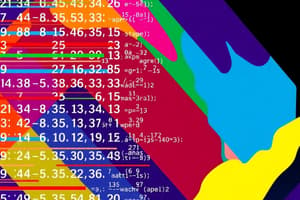Podcast
Questions and Answers
What is the main characteristic of an array in programming?
What is the main characteristic of an array in programming?
- It requires manual memory management for each element.
- It is a dynamic data structure that can change size.
- It consists of related data items stored in consecutive memory locations. (correct)
- It can hold data items of different types.
Which statement correctly describes the array index?
Which statement correctly describes the array index?
- Indexes can be negative integers.
- The last element index is always arraySize.
- The first element has an index of 1.
- The first element has an index of 0. (correct)
What happens if you try to access an index that is out of bounds in an array?
What happens if you try to access an index that is out of bounds in an array?
- It only affects the last element of the array.
- It results in an out-of-bound error. (correct)
- It returns a default value for the data type.
- The program compiles without errors.
In array initialization, which of the following methods can be used?
In array initialization, which of the following methods can be used?
How is the syntax for declaring an array structured?
How is the syntax for declaring an array structured?
What does 'c[a+b] += 2;' do when 'a' is 5 and 'b' is 6?
What does 'c[a+b] += 2;' do when 'a' is 5 and 'b' is 6?
What is the effect of declaring an array with a static size?
What is the effect of declaring an array with a static size?
Which of the following is a correct way to initialize an array of integers to zero in C++?
Which of the following is a correct way to initialize an array of integers to zero in C++?
Flashcards
Array
Array
A collection of data items of the same data type stored in contiguous memory locations.
Array Elements
Array Elements
Individual data items stored in an array, each accessed by its unique position or index within the array.
Array Initialization
Array Initialization
The process of assigning initial values to array elements.
Array Initialization using Loop
Array Initialization using Loop
Signup and view all the flashcards
Out-of-Bound Error
Out-of-Bound Error
Signup and view all the flashcards
Multidimensional Arrays
Multidimensional Arrays
Signup and view all the flashcards
Static Entity
Static Entity
Signup and view all the flashcards
Accessing Array Elements
Accessing Array Elements
Signup and view all the flashcards
Study Notes
Arrays
- Arrays are data structures that hold related items of the same type.
- Items are stored in consecutive memory locations.
- Arrays are a "static" entity, meaning their size remains constant throughout program execution.
Array Syntax
dataType arrayName[arraySize];(e.g.,int c[5];)arraySizerepresents the number of elements the array can hold.arrayNameis the identifier of the array, any valid identifier can be used- Data type specifies the type of data each element can hold (e.g., integer, float, char).
Array Elements
-
Each element in an array has a unique position or
index. -
The first element's index is 0, the second is 1, and so on. The last element's index is
arraySize - 1. -
Accessing array elements:
arrayName[index](e.g.,c[0]). -
[]is an operator with the same precedence and associativity as parentheses(). -
Array indices must be positive integers or expressions that evaluate to positive integers.
Array Initialization (Approach 1)
- Initialize elements using a loop.
- Example: A loop sets all elements of an array to 0.
Array Initialization (Approach 2)
- Initialize elements using an initializer list.
- Example:
int c[5] = {10, 20, 30, 40, 50}; - If the initializer list contains more values than the array size, a syntax error will occur.
- If the initializer list contains fewer values than the array size, remaining elements are initialized to 0.
Array Size as Constant Variable
- Use the
constkeyword to declare a constant variable for the array size. - Example:
const int arraySize = 10;
Out-of-Bound Error
- C++ does not perform array bounds checking.
- Attempting to access an element outside the valid index range leads to a logic error.
Multidimensional Arrays
- Multidimensional arrays, often 2-D (matrices), store data in rows and columns.
- Access an element using two indices:
arrayName[row][column]. - Example:
int b[2][2] = {{1, 2}, {3, 4}}; b[0][1]will access the element in the first row and second column (value is 2).
Studying That Suits You
Use AI to generate personalized quizzes and flashcards to suit your learning preferences.




